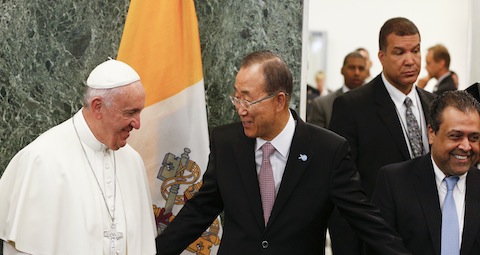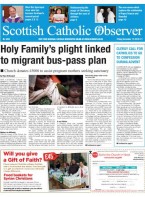BY Daniel Harkins | September 25 | ![]() 0 COMMENTS
0 COMMENTS ![]() print
print

Pope Francis addresses the United Nations
The Holy Father has said the ecological crisis threatens the existence of humanity in a wide-ranging speech to the United Nations General Assembly that called for an end to nuclear weapons and for international action to end war, destruction of the environment and associated exclusion of the vulnerable.
In his speech at the UN’s New York headquarters, the Holy Father also praised the recent deal struck over Iran’s nuclear capabilities and stressed the importance of the family.
The Pope began by praising the UN’s achievements—‘lights which help to dispel the darkness of the disorder caused by unrestrained ambitions and collective forms of selfishness.’
He called for the greater equality and singled out the UN’s financial bodies which should ‘limit every kind of abuse or usury,’ ‘care for the sustainable development of countries’ and ‘ensure that they are not subjected to oppressive lending systems which, far from promoting progress, subject people to mechanisms which generate greater poverty, exclusion and dependence.’
The Pope said that ‘no human individual or group can consider itself absolute, permitted to bypass the dignity and the rights of other individuals or their social groupings.’ et in today’s world, he said, there are victims of power badly excised, namely the natural environment and the ‘vast ranks of the excluded.’
The right of the environment exists, he said, because human beings are part of it and live in communion with it, and because ‘the universe is the fruit of a loving decision by the Creator.’
Misuse and destruction of the environment, the Holy Father said, is accompanied by a relentless process of exclusion.
“The poorest are those who suffer most from such offences, for three serious reasons: they are cast off by society, forced to live off what is discarded and suffer unjustly from the abuse of the environment. They are part of today’s widespread and quietly growing ‘culture of waste.’”
Solemn commitments to fix these problems are not enough, he added.
‘Our world demands of all government leaders a will which is effective, practical and constant’ to deal with social exclusion and its consequences: human trafficking, the marketing of human organs and tissues, the sexual exploitation of boys and girls, slave labour, including prostitution, the drug and weapons trade, terrorism and international organised crime.
The Pope called for education, particularly of girls, which is ‘ensured first and foremost by respecting and reinforcing the primary right of the family to educate its children, as well as the right of churches and social groups to support and assist families in the education of their children.’
“The ecological crisis, and the large-scale destruction of biodiversity, can threaten the very existence of the human species,” he said. “The baneful consequences of an irresponsible mismanagement of the global economy, guided only by ambition for wealth and power, must serve as a summons to a forthright reflection on man.”
Calling or an end to nuclear weapons, the Pope said ‘an ethics and a law based on the threat of mutual destruction—and possibly the destruction of all mankind—are self-contradictory and an affront to the entire framework of the United Nations.’
Drug trafficking, the Pope said, is silently killing millions of people, and, addressing the persecution of Christians in the Middle East, he said, that ‘hard evidence is not lacking of the negative effects of military and political interventions which are not coordinated between members of the international community.’
Concluding, the Pope said that the UN ‘can be the pledge of a secure and happy future for future generations… and so it will, if the representatives of the States can set aside partisan and ideological interests, and sincerely strive to serve the common good.’
Pic: Pope Francis was welcomed at the United nations headquarters in New York by Ban Ki-moon, the eighth Secretary-General of the UN










